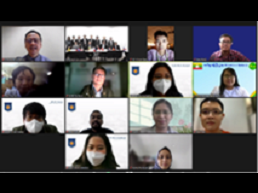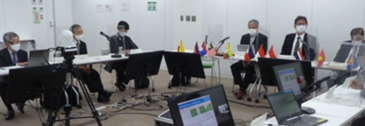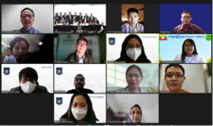
ECCJ held the FY2022 energy conservation training (ECAP28 online workshop) for ASEAN countries
<Training program>
Under the instruction and financial support of the Agency for Natural Resources and Energy (ANRE), the Energy Conservation Center, Japan (ECCJ) held an online workshop relating to decarbonization and EE&C promotion in the industrial and transportation sectors targeting persons in charge of EE&C policy-related divisions in the governments of the 10 ASEAN countries during the two-day period from Tuesday, October 25 to Wednesday, October 26, 2022. At the workshop, ECCJ gave support for improving the level of the systems for promoting carbon neutrality (CN) in ASEAN countries.
 |  |
View of Japan venue | Participants’ group photograph |
ECCJ held the online workshop with the following contents as part of the Scheme 5 program of the “FY2022 EE&C capacity building program for ASEAN countries”. The workshop had a total of 30 participants, focused on 25 policymakers from each ASEAN country and five persons from the ASEAN Centre for Energy (ACE). At the workshop, lectures were given on the administration and management methods, policies, new technology and case examples of activities relating to carbon neutrality in the industrial and transportation sectors. ECCJ also explained outlines of various new technologies for realizing carbon neutrality and held discussions with participants about how to introduce them.
(1) ECCJ gave explanations of the administration methods and Science Based Targets (SBT) relating to carbon neutrality management, and gained the participants’ understanding of the ASEAN country representatives.
(2) ECCJ introduced various types of technologies aiming to realize carbon neutrality in the industrial and transportation sectors, and was able to share a wide range of beneficial information.
(3) Through giving lectures relating to policies for realizing carbon neutrality in the transportation sector in Japan and on the Energy Conservation Act, it was possible to deepen participants’ understanding of the importance of taking diverse measures in the transportation sector and how energy conservation Act pertain to consigners.
(4) By introducing details of activities for realizing carbon neutrality conducted by the three companies comprising Sumitomo Chemical Co., Ltd., Ricoh Co., Ltd. and Seven & i Holdings Co., Ltd. as activities implemented by private companies, it is expected that these activities will be extended to each ASEAN country going forward.
(5) The development of a database including the emission factors required for calculating CO2 emissions is an important factor for mutually evaluating each ASEAN country, and it is expected that information sharing will be promoted during the discussions that will be held going forward.
(6) By holding an online questionnaire survey relating to new technologies and measures for realizing carbon neutrality, it was understood that the participants from ASEAN countries have a high degree of interest in a wide range of new technologies. Regarding the contents of technologies that are of particularly high interest, ECCJ intends to share detailed information in the ECAP from the next year, and will support the development of new technologies for achieving carbon neutrality to the ASEAN region.
* ECAP: Energy Conservation Workshop under AJEEP (ASEAN-Japan Energy Efficiency Partnership)

